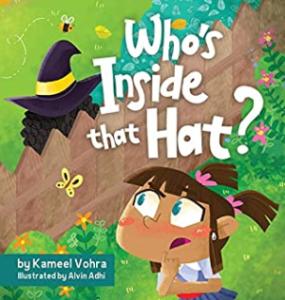I’m too witchy for my hat, too witchy for my hat, pointy, pointy hat!

Another book review requested by the author. As usual, I try to be more constructive than cranky on these.
This book is odd. I like the illustration style. It's pleasing to look at.
The main character is a girl named Anika. She jumps to conclusions like it's an Olympic event. It seems like it's supposed to take place in the real world, which makes her prejudiced in a bizarre and unrealistic way. A new person is moving in next door. She's looking over at the neighboring house, and keeps seeing things that make her think the new neighbor is a witch. She's got a pointy black hat. She's got a black cat. A wart on her nose. Then she stalks this poor woman to the market, spying on her as she buys a broom (gasp!) and vegetables (horrors!), and then accidentally falls over, scraping her knee and revealing herself. At which point she accuses the woman of both being a witch and planning on eating children. Why she blurted out what she was thinking at that point is baffling. If the setting is supposed to be fantastical, if the woman was a witch, wouldn't she then attack Anika in order to keep her secret? It seems like a dangerous accusation. If the setting is supposed to be realistic, just how deluded is Anika to think that witches actually exist, and that she knows all about them and what their motives are? Anyway, it turns out this woman, Amelia, is not a witch, and is a vegetarian, and despite being the victim of outrageous (and nonsensical) bigotry, she blithely helps Anika bandage her wounded knee and get home.
Are witches known for making "children stew"? The only witch I can think of in fairy tales who eats children is the one in Hansel and Gretel. Maybe I'm just not that informed about witch folklore.
The book is written in rhyme. The meter isn't great, and some of the rhymes sound quite forced. "'There is something spooky that I sense!'/A big ugly wart on a nose so very intense." "Intense"? Is that word referring to the wart? The nose? Neither one seems likely to be "intense". "Start" and "smart" rhyme, but neither one rhymes with "wart".
I'm thinking maybe I wouldn't have chosen to depict Amelia as black. Either that, or have Anika also be black. (As far as I know, there isn't a stereotype of black people being witches.) The book is trying to go for a "don't judge people by the way they look" moral, and if you're trying to teach a lesson using a metaphor for race, putting actual racial differences in the mix just gets really confusing. (Like, 'Oh, you're not really a witch, but you are a ---' kind of confusing.)
Accusing someone of being a "witch" (the existence of paganism and Wicca notwithstanding) could do real emotional damage, and the book doesn't address that. Nor does it address the idea that witches don't actually exist. (Amelia could just as easily say, 'I'm not a witch, but see that person over there? They certainly are.') And Amelia's "wart" being a bee sting is kind of a cop out. People can definitely have warts, and that doesn't make them terrible people.
So the story could have used some better editing to fix the meter and rhyme, and it'd be nice if Anika didn't just 'feel silly' but actually recognized how harmful her actions could have been, and apologized. Little things that wouldn't have been that difficult to do, but the author chose not to.
Here are my thoughts
1. First of all, perhaps Anika thinks witches exist because of her young age? How old is she supposed to be? Because I agree that she'd be deluded if she was like eleven, but if she was like four that wouldn't be too unusual. The same can be said about how Amelia would respond-- if I were in Amelia's shoes, I'd see it as bigotry if Anika was a middle schooler, say, but if she was a preschooler I'd just shrug it off like "kids say the darnedest things."
2. I agree that those rhymes sound forced, especially the "wart"-"start"-"smart" rhymes.
3. I also agree about the blackness thing. While it might not be a metaphor for race (possibly it's a more generalised theme than that; like a moral that could be applied to both race and things like clothes or whatever-- or did the author specifically say that it was a metaphor for race?) and I also don't think there's any stereotype about black people being witches/wizards, it still seems a little awkward to have Anika be white and Amelia be black, because some readers might worry that she's being racist.
4. I also agree that the story should have addressed the fact that witches don't exist, and that it would have been better if it had been a real wart.
5. I wonder what "feeling silly" means in this context? Guilty? Embarrassed? Both? Neither? Either way, I agree that Anika should've apologised.